Takashi Yoshikawa is no easy man to figure out. Trim and well tanned, the 63-year-old owns a small ryokan (traditional inn) nestled in the foothills of the beautiful Shirakami Mountains which straddle 130,000 hectares of Aomori and Akita prefectures, and whose 17,000 hectares of beech forests were listed as a UNESCO World Heritage site 20 years ago.
So far so good — but Yoshikawa is also one of Japan's very few remaining matagi (hereditary bear hunters), whose history is said to date back to the Heian Period (794-1185). He makes no secret of that fact, as the business card he hands me describes his Kumano Yu Onsen ryokan set beside the upper reaches of the River Akaishi in the town of Ajigasawa, Aomori Prefecture, as "an inn run by a matagi."
But then things turn a little pear-shaped the moment I ask him about his life as a bear hunter. "I'm no longer a matagi," he says sternly. When I press further, he bluntly declares: "Matagi can't share stories about their life in the mountains with women and children. It's not something we can talk about in the village."
Then, as if he'd foreseen my disquiet, he quietly confided: "(But) I can talk about it now because I'm no longer a matagi."
Confusingly, though, it soon becomes clear that Yoshikawa is still very active as a bear hunter following the traditional styles and techniques, and performing the same rituals passed on for generations in the local matagi community. In fact, he tells me, he is the 21st-generation descendant of a native bear-hunting family, having himself started at the age of 15.
As for him declaring he is "no longer a matagi," it seems that's because, strictly speaking, a matagi must hunt in a group — and by about 20 years ago the others in his group had all dropped out due to injury or old age. Since then, Yoshikawa has been a lone hunter, having refused to join any other group because his "approach toward hunting and the mountains" differs from those among the other, dwindling ranks of hunters.
So what is his approach? "Bears are blessings from the Mountain God," he says. "We handle them with special care — we must make sure they won't go extinct, by not catching too many of them at a time. Yes, we kill them (to eat), but we must ensure they are thriving so we can live with them for a long time."
Yoshikawa says he was naturally drawn to life in the mountains from early on. He still remembers his first encounter, when he was just 15, with a tsukinowaguma, the Asian black bear whose Japanese name literally means "crescent bear," from the V-shaped white marking the animals have on their chests.
At that time, he was in a group of 11 matagi who were based at one hut for as long as a month, he says. Each man was assigned a different role by the group — whether as the shikari (boss), who decided the overall hunting strategy and gave directions, or as a ko-matagi (trigger man) or a boiko, whose job was to shout and beat the bush to drive bears toward the guns.
As a young matagi, Yoshikawa started from the bottom of the hierarchy — as a boiko, before rising to become the shikari for four or five years until the UNESCO World Heritage listing made bear hunters' lives difficult by severely restricting access to the mountains.
Of course matagi had always had many rules handed down to them about what not to do in the forests — but there were few specific lectures or lessons on what to do, he recalled.
"You can't laugh, you can't blow whistles, you can't sing," he said, noting that he learned the ropes by watching other, more experienced hunters. "You can't use the language you use in the village, even. If I spoke at all without being told to, I would be hit with a fist."
Yoshikawa explained that matagi would normally hunt in spring when the snow had begun to thaw but was not gone completely, so the black bears stood out against the white background. They would also go out in autumn when the leaves had fallen and the bears had fattened up before hibernating.
He also confided that the hunters had a special vocabulary, like a secret code, which included referring to kuma (bears) as itachi (weasels), for example.
"The old folks believed that it's because bears knew that humans used the word kuma to identify them. The hunters really believed that if the bears heard the word itachi, they would not run away, thinking the hunters were talking about a different animal. The old hunters used to believe stuff that children today would just laugh at as being utterly ridiculous."
During my recent visit, Yoshikawa took me out on a short trek to the mountains, pointing to different trees and plants and explaining how some are edible and some are useful for making incense, herbal medicine or ropes.
Then, as we approached the forest proper, he started revealing many more words unique to the matagi community. "We call the sun 'tonbi' ('black kite'), rice 'kusanomi' ('grass berries') and spears 'tate' ('shields')," he said, adding that there were a lot more words like that — "but it's strange that I remember them all only when I come to the mountains."
As for why matagi came to use such idiosyncratic vocabulary, Yoshikawa suggested, "I guess it's because, as we enter an unusual territory, we need solidarity as a group. The best way for the boss to manage his members is to change the language altogether, making them feel closer to each other."
In addition to the language, being a matagi entails adopting a whole set of beliefs and superstitions. Certain numbers, such as seven and 12, were considered unlucky, while newly married men and those whose wives had just given birth were banned from joining the hunt, he recalled. On the other hand, those who had just lost a loved one or who had just attended a funeral for a close family member were welcomed, he said.
"Those who were mourning were welcome on the grounds that hunting would give them a change of mood," he said. "On the other hand, those who had just got married or had babies were shunned, because they would miss their families so much they wouldn't be able to concentrate on hunting.
"The matagi culture looks tough and not gentle, but in fact it really is basically gentle," he said with an enigmatic grin — adding that it's also a culture only open to direct male descendants of a matagi, so not even neighbors or friends could join a hunting group. But he explained that a hunter's actual role within a group was decided purely on merit. "If you are a ko-matagi and miss shots, you would be demoted to a boiko," he says. "It's completely based on your performance.
"As for the boss," he continued, "he must not only be smart but must also have leadership and be likeable. And he has to be good at hunting, above all else. It's the same as a soccer coach; you must make the team win."
Nowadays, Yoshikawa says he only goes hunting once a year, just to catch one bear — and he doesn't stay out overnight because there are now enough trails in the mountains so he can walk back home every day. He says he misses the days when he could feel his sensory perception grow sharper as he stayed for days and days alone with other hunters. But regardless of such changes, the matagi spirit seems alive and well in Yoshikawa — who considers bears "his equals," he said.
"I've fought with bears, face to face," he told me, showing scars on his arms from their lethal claws. "I've come in very close contact with bears about five times in my life. One time, when I saw the eyes of a bear (that I was trying to kill), I realized she was as desperate as I was to fight, with tears in her eyes. She cried, and I cried, too. I sometimes wondered which was a bear and which a human being."
As the end of my day out with Yoshikawa approached — a day that had included us trekking to the foot of the awesome, 85-meter Kurokuma no Taki (Waterfall of the Black Bears) and a hike around the beech forest in Ajigasawa — I came down from the hills with a profound sense that this enigmatic man, and his fast-fading way of life, are what make the area truly special. A world heritage, indeed.
Kumano Yu Onsen, the hot-spring inn run by Yoshikawa and his wife, Kyoko, is 20-min. by car from Ajigasawa Station on the JR Gono Line in Aomori Prefecture. It is open from early June through late October, and a night's stay with two meals is ¥7,350. Additionally, a deliciously mild bear stew can be yours for ¥2,000. For more information, visit: jtim.es/n7bic or call the Ajigasawa's Kanko Kyokai (Tourism Association) at 0173-72-5004.



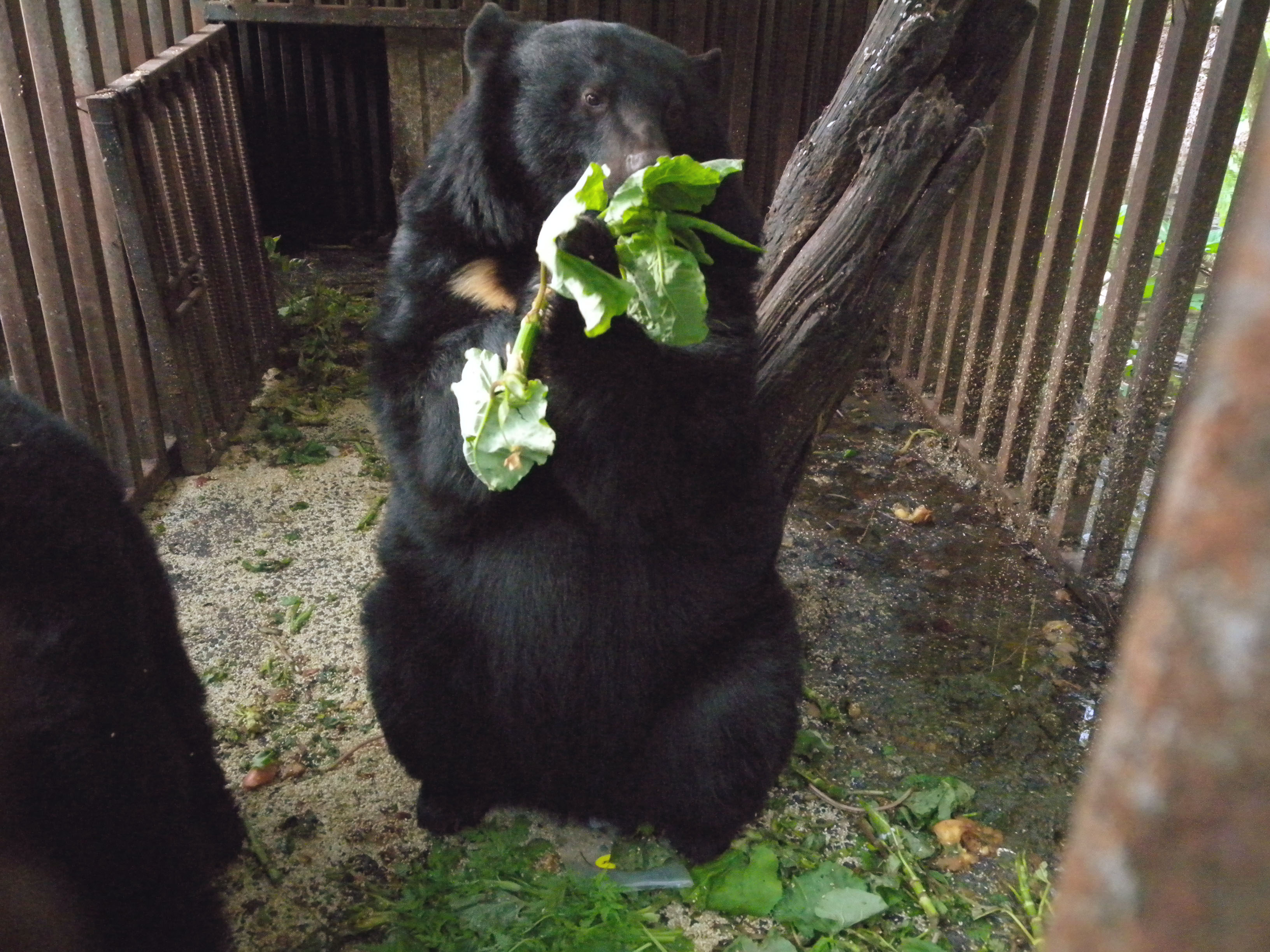
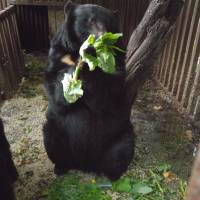
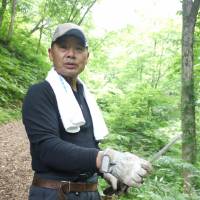
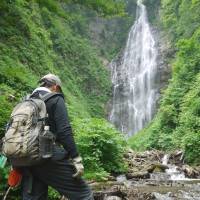
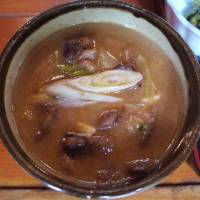














With your current subscription plan you can comment on stories. However, before writing your first comment, please create a display name in the Profile section of your subscriber account page.